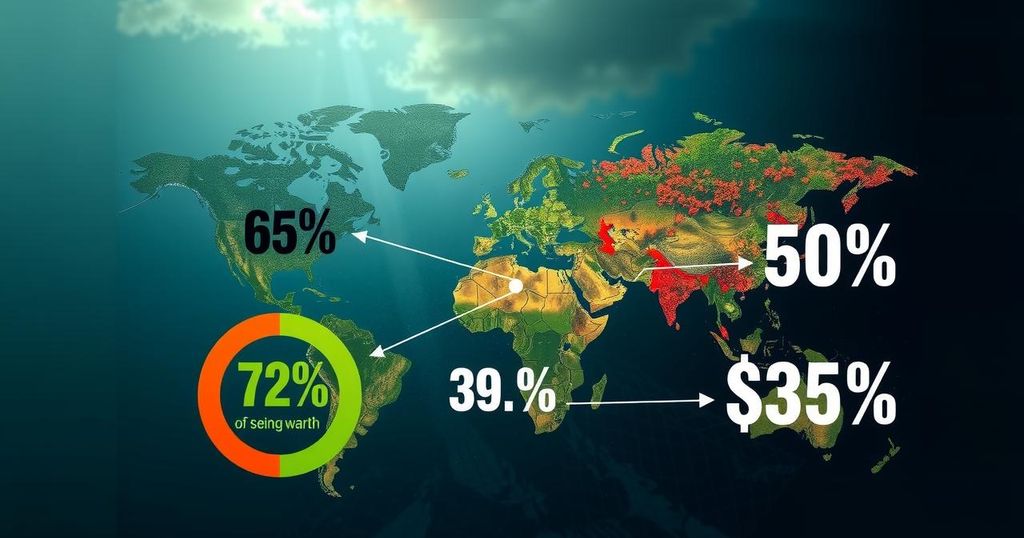Climate change is causing historic health threats as indicated by the Lancet Countdown report, which highlights extreme weather, rising disease cases, and increased fatalities. The report reveals that 10 out of 15 monitored health indicators are at alarming highs and emphasizes the urgent need for immediate action to mitigate these health impacts as we approach potentially the hottest year on record.
Climate change is inflicting unprecedented harm on global public health, as highlighted in a significant report issued by leading experts on Wednesday. They warned that “wasted time has been paid in lives.” This alarming finding coincides with extreme weather events, including heatwaves, wildfires, hurricanes, droughts, and floods, which have contributed to 2023 potentially becoming the hottest year recorded. This report comes shortly before the UN’s COP29 conference scheduled to take place in Azerbaijan and just ahead of a U.S. election which may see the return of climate change skeptic Donald Trump to the presidency. The eighth Lancet Countdown report on health and climate change, authored by 122 specialists from various UN agencies, including the World Health Organization, presents a grim assessment of the ongoing health crisis precipitated by climate change. Of the 15 indicators monitored over the last eight years, 10 have reached alarming new highs. Key findings include a notable increase in extreme weather events, a 167 percent rise in heat-related deaths among the elderly since the 1990s, and a dramatic spread of infectious diseases due to expanding mosquito habitats. For instance, 2022 marked a record year with over five million dengue fever cases reported globally. Furthermore, the degradation of approximately five percent of the world’s tree cover between 2016 and 2022 significantly impairs Earth’s ability to absorb carbon dioxide from human emissions. The report reveals that fossil fuel interests, alongside certain governmental and financial institutions, continue to exacerbate the climate crisis, having inflated greenhouse gas emissions further last year. The World Meteorological Organization reported this worrying trend despite decades of urgent warnings. Notably, large oil and gas companies have seen record profits, leading to increased fossil fuel production. Compounding the issue, governments responded to soaring oil prices after the 2022 Russian invasion of Ukraine by providing $1.4 trillion in fossil fuel subsidies, far outweighing commitments to facilitate a transition to sustainable energy. However, the report does present some encouraging developments. Deaths attributed to fossil fuel-related air pollution decreased by nearly seven percent from 2016 to 2021, largely due to efforts in reducing coal pollution. The share of electricity generated from renewable sources nearly doubled during the same period, rising to 10.5 percent. Additionally, there are indications that climate dialogues are increasingly recognizing health as a crucial aspect, especially in the context of the upcoming COP discussions and national climate strategies expected next year. Marina Romanello, executive director of the Lancet Countdown, emphasized, “If action is not taken today, the future will be very dangerous. There is really no more time to waste – I know we have been saying this for many years – but what we are seeing is that the wasted time has been paid in lives.” She advocates for individual actions such as adopting eco-friendly diets, using sustainable transport options, disassociating from banks investing in fossil fuels, and supporting political candidates who pledge to address climate change effectively.
The rapidly escalating impacts of climate change on human health have prompted significant concern among experts and health professionals. The Lancet Countdown is an initiative that tracks these health impacts and their correlation with ongoing climate changes, using various indicators to illustrate trends over the years. The release of this latest report arrives amidst a backdrop of increasing extreme weather conditions and crucial global meetings like the upcoming COP29 talks, reflecting a pivotal moment for policy and action against climate-related health threats. This discourse emphasizes both the dire situations faced due to climate change and the emerging responses toward a healthier future.
In summary, the report elucidates the severe and unprecedented threats posed by climate change to human health worldwide, highlighting record levels of disease spread, extreme weather events, and fatalities, particularly among vulnerable populations. Despite these challenges, there are signs of progress in addressing pollution and increasing reliance on renewable energy sources. Urging for immediate action, experts stress that the time for decisive climate action is critically urgent, as delayed responses have already resulted in significant loss of life.
Original Source: www.rfi.fr






